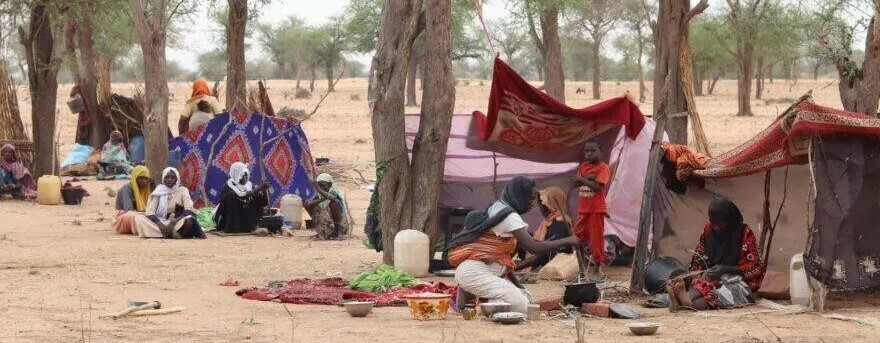The devastating consequences of war extend beyond the obvious horrors of murder, plunder, rape, displacement, asylum, homelessness, and diseases. These crises inflict profound suffering on individuals, making it challenging for them to accept and adapt to their new realities.
In the aftermath of conflict, millions of Sudanese were compelled to abandon their homes and seek refuge in neighbouring Chad, where over half a million refugees found solace. Chad, in a display of compassion, provided more than ten camps around the city of Adre to accommodate them.
As the refugees arrived in Chad, escaping the turmoil in various regions of Darfur, they brought with them the haunting echoes of cannons, tanks, and various forms of ammunition. These harrowing experiences led to widespread psychological trauma among the majority of the refugees, whose humble dwellings now house hundreds of mentally distressed individuals, victims of the senseless wars they fled.
Families in Chad’s refugee camps are grappling with the challenges of caring for the sick amidst a scarcity of essential resources such as medical treatment, food, and shelter.
The harsh conditions have forced them to confront violent behaviour directed at both the families and the broader social environment, leading some families to resort to chaining their sick members with ropes to shield them from physical attacks and verbal abuse.
Even before reaching Chad, families faced the violent behaviour of patients, a dearth of treatment options in the camps, and the overarching dangers of war.
Interviews conducted by Radio Tamazuj with families inside the refugee camps shed light on their struggles and the limited treatment services available to them.
A sister of an injured individual (M, A, C) from Nyala, recounts her brother’s injuries dating back to 2004 during the Darfur war. She describes her brother as prone to violent outbursts and suffering from severe neurological conditions, with no therapeutic services provided since their arrival at the camp. Lack of treatment has taken a toll on the family, which lacks the means to address his condition.
Similarly, the sister of another injured individual (S, Y, A), aged 34 and hailing from the Ardamata area in West Darfur State, says her younger brother sustained injuries in battles in Kulbus locality, located in the far north of West Darfur State.
The sister of an individual (M, A, C) from Nyala, reflecting on her brother’s deteriorating condition, highlighted the impact of the recent incident in Erdamta and expressed their financial struggles to cover the costs of treatment.
Despite attempts at municipal treatment, it proved ineffective. Currently, her brother relies on sedative injections administered monthly. Without these injections, he becomes prone to aggressive behaviour, targeting passers-by with stones and offensive language on public streets, she explained.
The injections, of both Egyptian and Sudanese origin, are attributed to the wars in the region. She also revealed that her brother’s right eye suffered damage from a street assault.
The financial strain prevented them from consistently providing the necessary medicine. She shared the difficult decision to restrict medication, as any negative behaviour exhibited by her brother in public would make his family accountable.
Adding to the family’s challenges, her daughter battles anaemia, and her sister copes with a mental illness, compounding the need for comprehensive medical attention.
While Doctors Without Borders visited the camp, the family, unfortunately, received no treatment services. The family’s journey to Chad began through the Tindelti region, situated in the northwestern part of the state on the Chad border, following an incident involving the Armed Forces and the Rapid Support Forces in the Erdamta Administrative Unit.
During a recent tour with the family of a patient (C, A, A) from Nyala, he voiced his perspective, stating, “It was injustice that brought him to this stage.”
His mother recounted their search efforts, saying, “We found him after searching in many places.” He noted an improvement in his condition after taking pills but emphasized that it worsened upon reaching the Chadian region of Adre, where treatment was unavailable.
Expressing gratitude for being spared the sounds of ammunition and condemnations, the mother acknowledged the challenges they faced.
Meanwhile, the sister of a patient (S, A, A) from El Geneina, Madras neighbourhood, shared a harrowing account. Having lost her mother and older brother during the El Geneina fighting, she revealed that her family of seven members was caught up in a burning house burning. In Adre, her brother’s traumatic experiences in El-Geneina manifested as violence towards the family, prompting their escape and his restraint with chains.
Despite their ordeal, the family received no therapeutic services in the camp. They took their brother to Umm Kharouba Hospital in Chad, incurring the expenses themselves. However, the prescribed pills exacerbated his health condition.
The patient, speaking to Radio Tamazuj, disclosed, “I had a psychological condition, but currently, my condition is stable.” Describing an incident in El Geneina during Ramadan where he was injured, he admitted to mistreating his family, leading to them restraining him.
Despite seeking medical assistance in El Geneina and taking injections and pills, his condition worsened after the events in Ardamta. The patient emphasized that no one has provided them with treatment since arriving in Chad.
The overall situation of psychological patients in the camps has worsened due to increased psychological pressure from asylum challenges, coupled with the lack of essential resources like medicine, food, and suitable housing.
These individuals have become unwitting victims of the ongoing senseless war in Sudan.
To contact Radio Tamazuj with comments, news tips or information, write to radiotamazuj@gmail.com or use the contact form.




